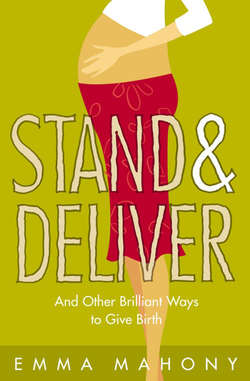Читать книгу Stand and Deliver!: And other Brilliant Ways to Give Birth - Emma Mahony - Страница 30
Placenta Matters
ОглавлениеThe placenta is like a giant root system, tapping into the mother’s bloodstream. As the embryo implants within the uterine wall lining, cells branch out to destroy the wall separating the mother and child and expand the diameter of the blood vessels. The mother is able neither to constrict the vessels supplying the embryo, nor to regulate the flow of nutrients to the placenta without starving herself, so the baby gains considerable control over its own intake.1
By the 8th week of pregnancy, the placenta composes 85 per cent of the total package and, end to end, the villi (the finger-like projections to increase the absorptive surface of the placenta) stretch about 30 miles. Once the placenta has secured the supply lines, then and only then does the baby start growing. If you worry that morning sickness is ridding your body of all your best efforts to eat healthily, don’t. There are studies to suggest that vomiting may even stimulate early placental growth.
The most important addition to make to your healthy eating in the early days is to eat fresh fruit and veg. There is no need to limit your intake, eat as much as you can as often as you can. There is new research to suggest that such a diet high in vitamin C will also combat free-radical damage to blood vessels, lower blood pressure and reduce the incidence of pre-eclampsia – a dangerous condition that occurs usually in late pregnancy and requires the baby to be delivered immediately.
Also, recent research from Denmark reported in the British Medical Journal showed that women who eat a diet rich in fish during pregnancy are four times less likely to give birth prematurely. Among 8,700 women surveyed, 7.1 per cent who never ate fish had a premature delivery, yet only 1.9 per cent per cent of fish-eaters did. So, if you are still working, have smoked salmon sandwiches, along with some apples and oranges at your desk, and ignore the office vending machine.
Like most marathon runners, you will need to drink plenty of water (up to 2 litres a day). If you can’t face water, try caffeine-free teas chilled in the fridge or the (fairly foul) raspberry-leaf tea, a good uterine-toner, found in health food shops. My American birth partner was so obsessed with my raspberry-leaf tea intake (not to be confused with a delicious Raspberry Zinger from the Twinings Exotic selection) that she was forever brewing up another cup of the tasteless soup for me as the birth approached. It is difficult to see what such a herbal remedy can achieve other than rehydrating you, but raspberry-leaf tea is strong enough to carry a warning that it shouldn’t be taken before 28 weeks or by women with a history of pre-term labour. Suzannah Olivier, author of Eating for a Perfect Pregnancy, recommends doubling your intake as labour starts, to help things go smoothly.2
Suzannah Olivier is also unequivocal about the need to take supplements. Don’t skimp and take herbal alternatives to the ones on sale in most chemists, buy the standard Pregnacare, sit it on your bedside table and make it part of your morning ritual throughout pregnancy. The same goes for folic acid during those first three months.
If, however, you are reading this on your way to the delivery suite and haven’t let anything but a good healthy diet pass your lips, don’t panic. Some midwives, such as Mary Cronk, believe that that is all a woman needs during her pregnancy, and that taking unnecessary supplements benefits only the manufacturers. Says Cronk: ‘Supplements, particularly iron in a woman who has plenty, can imbalance the system and lead to lack of absorption of trace elements. Women eating well are usually getting all the goodies their body and baby need.’
